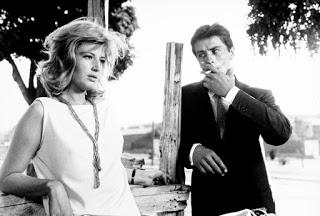 Michelangelo Antonioni's films maintain a detached stillness that cineastes either find engrossing or dull. L'Eclisse (1962) is his third collaboration with Monica Vitti, offering few signposts for audiences in exploring existential dread.
Michelangelo Antonioni's films maintain a detached stillness that cineastes either find engrossing or dull. L'Eclisse (1962) is his third collaboration with Monica Vitti, offering few signposts for audiences in exploring existential dread.Vittoria (Monica Vitti) leaves her boyfriend Riccardo (Francisco Rabal), no longer happy with their relationship. Her shrewish mother (Lilla Bringone) and vapid friends offer little comfort. Then Vittoria meets Piero (Alain Delon), a charming young stockbroker. The two begin an affair, but Vittoria remains unsatisfied with herself.
L'Eclisse provides a depressing portrait of alienation. Antonioni's protagonists are unable to connect in ways obvious and subtle, from clashing outfits to mismatched conversations. Vittoria and Piero go virtually the entire film without making eye contact; their most intimate moment is a kiss through dividing glass. When Piero tears her dress, Vittoria blames her clothing for not being strong enough. Their resigned passivity wearies the viewer, who wants to shake common sense into them.
Antonioni makes his protagonists bored, materialist bourgeoisie. Vittoria's mother blows money at the stock market, while Piero scores with illicit trades. When the stockbrokers hold a moment of silence for a dead colleague, their phones ring deafeningly, capitalism oblivious to humanity. Vittoria's friend Marta (Mirella Ricciardi) shows off African bric-a-brac while belittling the Mau Mau "savages" overrunning Kenya. Her appeal to primitivism is merely an exotic fetish rather than an escape.
Antonioni compounds the dourness with forbidding locales and Gianni Di Venanzo's doom-leaden camerawork. Long takes prowl empty streets, dripping wells and fractured skylines, including an odd ERU building with a flying saucer dome. Characters are isolated, whether alone in home, prowling empty streets or lost in a stock market or store. The long ending shows Antonioni at his most experimental, a series of eerie, bizarre images (a horse-drawn rickshaw cantering down an empty street, strange garbage piles, gaslights in fog) stressing Vittoria's empty existence.
Monica Vitti's character is more hopeless than L'Avventura. Rather than finding solace in her relationships, she sinks deeper into despair. Vitti underplays with a spooky detachment that suggests depression. Alain Delon interjects sharp energy into his scenes, before he too is consumed by angst. Mirella Ricciardi and Rosanna Rory play charmingly repulsive harpies, though Lilla Bringone seems a caricature.
L'Eclisse seems specifically made for critics and film students, who can relish deciphering Antonioni's heavy, ponderous symbolism. For most viewers, it's easier to respect than enjoy, a downbeat, consuming journey into the mouth of despair.

